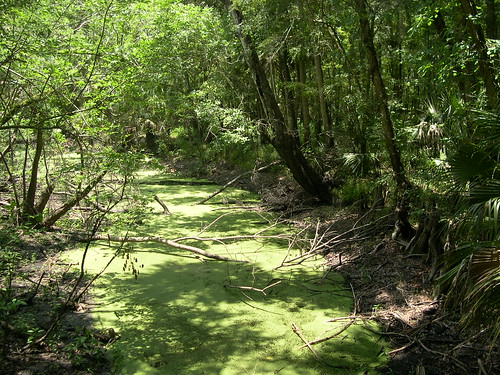
Bathsheba never forgot that transient little picture of Liddy crossing the swamp to her there in the morning light. Iridescent bubbles of dank subterranean breath rose from the sweating sod beside the waiting maid’s feet as she trod, hissing as they burst and expanded away to join the vapoury firmament above. Liddy did not sink, as Bathsheba had anticipated.
She landed safely on the other side, and looked up at the beautiful though pale and weary face of her young mistress.
—Thomas Hardy, Far from the Madding Crowd, Chapter XLIV
“Unpredictable soughs full of brown water threaded its endless slopes of sodden tussocky grass, and queer rocks were embedded along its rheumy skylines, eroded by the wind into vague and organic silhouettes.”
—M. John Harrison, “A Storm of Wings,” Chapter 6
I’ve trotted out another quote about swamps today, from the ‘Viriconium’ series of M. John Harrison, in order to point out by comparison just how good a nature writer Hardy is. In the few passages I’ve posted, we’ve seen how he engages all the senses through writing in order to make the environment seem more lifelike. The Viriconium stories are lively and elaborate fantasy stories, about a world at the end of time, and it’s not fair to make over-broad assumptions about books or authors through a single sentence. Here’s another, from indoors:
They stood in the shadow of a huge dead locust, or perhaps it was a mantis. Its forelimbs were folded hieratically above them, clutching something they couldn’t see. Leathery curtains of dried mucus hung down from its ventral joints and openings. Its fading telepathies trickled through Hornwrack’s skull in a reedy counterpoint to the perceptual disorganisation that swelled over him like triumphant organ music from the city’s living inhabitants. His eyes were watering in the lemon fog from the exploding atmospheric distilleries; his nose was running. A tarry fungus flourishing in the shade of the great corpse had begun to corrode the soles of his boots.
—ibid, Chapter 10
Watch the master at work! Hardy first frames his scene in Bathsheba’s eyes, which emphasizes the things that she is seeing. “Bathsheba never forgot…” Then, he limits his description to one sentence (having signaled that brevity, too, with “transient little picture…”). And in that one sentence, he describes the color (“iridescent”), smell (“dank, subterranean”), texture (“sweating sod”), and sound (“hissing as they burst”). And then, to wind it up, he describes the overall impression of the bog through Bathsheba’s eyes and assumptions again: “Liddy did not sink, as Bathsheba had anticipated.” We readers know that the marsh is the kind of footing which appears to have the potential to swallow a traverser whole, because Hardy points out (in only four words, natch!) that Bathsheba held that impression.
In contrast, the Harrison quotes seem static and long-winded to me.

